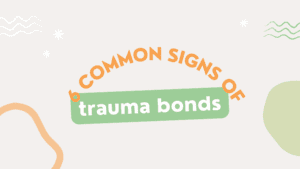Trigger Warning:
This post discusses abuse in relationships. If you or someone you know is in an abusive relationship, know that you are not alone. Here at online-therapy.com we provide support for people of various life circumstances. If you are in need and in the United States, you can call the national domestic violence hotline 24/7 at (800)787-3224. In a crisis, call your local authorities.
What is a Trauma Bond?
Trauma bonding happens when a person in an abusive relationship develops a deep emotional bond with the other person. In media we see exaggerated, and not always accurate depictions of trauma bonds, such as with Harley Quinn and the Joker from the Batman series. Trauma bonds are a lot more complicated in reality.
Typically, in a trauma bond is the result of a dysfunctional attachment to the perpetrator. That is not to say that the victim isn’t aware of what the other person is doing. Contrarily, usually the victim is very aware of the duality of their partner both love bombing them while also displaying abusive tendencies.
In this article, we are going to discuss six common features of trauma bonds. Please note, that there are circumstances where one of these symptoms can be attributed to a non-abusive relationship. The purpose of this article is to raise awareness for the most common symptoms of trauma bonding, so that you or someone you may know can begin to consider these factors in the context of the relationship they are in.
Most importantly, please know that help is available if you feel uncomfortable in your relationship, abusive or not. Online-therapy . com has therapists specially trained in relationships. We are happy to assist you with any of your needs. Remember, you have so much to offer. We are here to help you advocate that.

Common Signs of a Trauma Bond
Blaming Yourself for Abuse
One of the most common symptoms of a trauma bond is the victim blaming themselves for the abuse. A victim may think “if I only I said/did this instead…” or “they are right, I should not have…”
While it is a common expr5ession that “it takes two to tango,” there is a caviet when it comes to abuse. No matter how challenging a relationship becomes, abusive tendencies of any kind is not the response. The person on the receiving end of that abuse is not at fault- the other person is looking for a sense of control in the situation.
While it may be challenging to not be hard on oneself, the person on the receiving end can speak with a trusted neutral third party who will ensure their privacy to help highlight this point.
Lies About or Justifies Partner’s Behavior to Friends and Family
A victim may try to cover up or justify their partner’s behavior. This can happen for several reasons. One, the victim may not want their loved ones to worry about them. Two, the victim may be worried about their safety if their family or friends challenge the perpetrator. Third, the victim may not be ready to handle their friends or family’s worry or concern.
At its core, the primary reason a victim justifies their partner’s behavior is to maintain a sense of calm or order in the middle of chaos. If you are a family member or a friend of someone in an abusive relationship, support your loved one and help get them to safety and with someone neutral they can talk to. If you are a victim, don’t be afraid to find resources of people you can safely go to for help.
Unable to End Things (For Reasons Other than Safety)
Leaving abusive relationships can be hard. Sometimes, safety concerns are involved. In trauma bonds, however, leaving an abusive relationship goes beyond finding it difficult to leave a relationship for safety reasons.
In a trauma bond, the keyword is bond. Remember, the victim has an emotional attachment to the perpetrator. As a result, these feelings of attachment can make it more challenging to leave. It is important when things are tough to leave to look at the relationship as whole. If there are more negative experiences than positive, it is important to look at those potential red flags and assess them.
Saying the Good Days, Even if Few, Outweigh Bad
As mentioned, it can be hard for a victim to end things in a trauma bond, even if the negative happens more often than the positive. Similarly, the good days may feel more impactful than the bad.
This is because we often look for things to prove what we hope for or are convinced of. This is known as confirmation bias. If a person wants good times as a reason to stay with their partner, then a victim may believe the good days outweigh the bad.
For example, in trauma bonding, an abuser may go through periods of displaying many compliments or acts of love, known as love bombing. Love bombing is used as a method of control. Love bombing, however, can be easily mistaken for good days. These may be used for confirmation bias to outweigh the good over the bad.
Keeping Partner’s Secrets
As a part of the trauma bond, the victim may want to protect their partner. This is related to wanting the good days to outweigh the bad. The victim often desires for things to get better. As a result, they may keep secrets (such as the abuse) to keep the peace.
Keeping secrets can be dangerous though and may impact a person’s safety. If this applies to you, remember there are neutral people who you can safely discuss these things with to make safe future decisions for yourself.
You Hope to Change Partner
The last symptom we are going to review in this article is the victim’s hope to change their partner. Usually, a person’s partner does not start out as abusive. As a result, a victim may desire for how things were before the abuse began. Another possibility is that the victim hopes their partner will love them enough to change from their abusive patterns.
It is important to take things at face value, and if your comfort or safety is at risk to meet yourself where you are now. There are most resources which can help discuss with you next steps on your safety and ways to keep yourself happy and safe.
Next Steps
Here at Online-Therapy.com we take relationships seriously. We value happy, healthy relationships, and wish to help those who are struggling in their relationships. We offer video, voice, and chat sessions so if confidentiality is an issue for you, we can still assist!




Leave A Comment